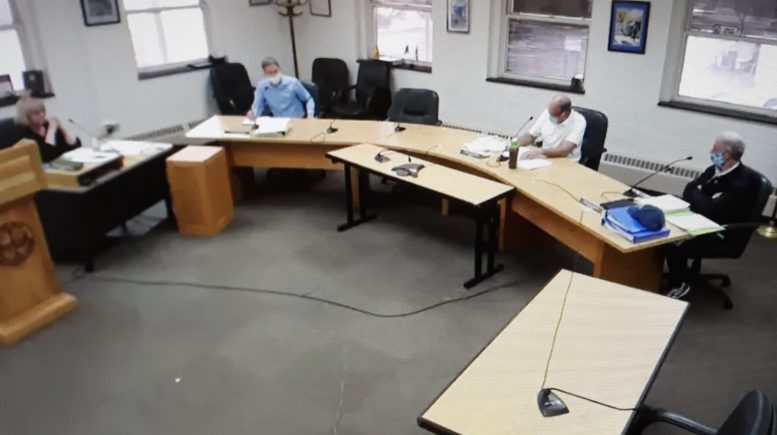By JAN LARSON McLAUGHLIN
BG Independent News
Bowling Green officials are searching for a middle ground on proposed rental housing rules.
During five public hearings on rental housing conditions in the city, renters told of landlords of not providing safe living conditions, and landlords defended their properties and resisted any type of inspections.
Last week, members of City Council’s Community Improvement Committee met again to try to come up with steps that could help remedy rental housing problems – and pass approval by a majority of City Council members.
The CIC members – John Zanfardino, Bill Herald and Neocles Leontis – represent a microcosm of the overall issue, with Herald embracing a more conservative perspective, Leontis a more liberal stance, and Zanfardino sitting somewhere in the middle.
The three agreed the city should adopt some type of rental registration program – but disagreed if the city should go further by inspecting rental housing.
“If we go too far with this, we’re not going to succeed,” Zanfardino said. “We need a middle ground approach.” Inspections could require the city to hire multiple staff, and create “significant” fees for landlords, he said.
Herald voiced concern that city-required inspections of rental housing could overburden landlords, resulting in the costs being passed onto tenants.
“My greatest concern is this will dramatically increase rents in town,” Zanfardino said.
Leontis has pushed for inspections of rental units as the only way to ensure that housing is safe.
Leontis disputed predictions that an inspection program would be expensive. In some other communities, the registrations and inspections cost about $100 a year per unit. Based on the comments made by landlords during public meetings on the topic, Leontis said the expenses shouldn’t go beyond that.
“We keep hearing from them that all their properties are perfect – that we don’t need to do this,” he said. “I take issue with that argument.”
If the rental properties are indeed “perfect,” then the expense should be minimal, Leontis said.
“We have to do what’s been proven effective in other cities, so we don’t waste time,” Leontis said.
Zanfardino said he believes that inspections would be the best way to guarantee rental housing is meeting standards, but voiced his doubt that the majority of council would agree.
“I just don’t think that’s going to occur,” he said.
Herald said an inspection program could result in “dire straits” for landlords and tenants.
But as the CIC members came to the end of their meeting last week, they appeared to find another plot of middle ground on inspections. The three agreed to recommend that at least random inspections of rental housing be performed.
The three also agreed on the creation of a checklist that landlords would have to complete for each rental. The checklist must then be displayed at each rental home. And each landlord must be licensed, they agreed.
“You can’t rent unless you’re registered,” Herald said.
“If we take these two steps (registrations and checklists) and it doesn’t take care of the problem,” then the city can adopt further regulations, Zanfardino said.
“We don’t have the community support to take too many steps,” right now, Herald said.
Based on 175 responses from the community on the topic of rental regulations, five provisions were also suggested last week – with varying levels of support.
Following were the other recommendations presented by Herald:
- Codify the court decision made last year linking the number of bedrooms in a home to the number of renters permitted – and set up an aggressive fine and enforcement procedure. Many safety and health issues can be reduced by cutting down on the instances of over-occupancy of rental units.
- Bring back the city’s housing commission and re-task it to handle rental issues.
- Phase out grandfathered legal, non-conforming rental homes.
- Create a Neighborhood Enhancement Fund. Draft legislation has been drawn up to allow for a mechanism to award grants to improve single- and two-family homes.
- Institute rental registration. Any effort to have rental licensing or inspections should begin with registration. Each landlord would need to complete a form for each rental unit. A rental unit would not be able to be rented out if the site is not registered. Information on the registrations would be posted to a website.
Leontis stressed any website on rental properties must be based on independent inspections.
“That will be the way quality information will be provided,” he said. “It will increase transparency and make it better for renters.”
The website must be city-managed, and not allow unsubstantiated comments to be made by renters. “We can’t allow people to trash property owners,” he said.
Leontis suggested that landlords be required to submit housing plans to the fire division, so firefighters are aware of where bedrooms are located in homes. Leontis said other commercial businesses are required to submit building plans to the fire division.
Zanfardino questioned the value of re-establishing a housing commission.
“I don’t have the same fond memory that you do” of the former housing commission, he said to Herald.
“Absolutely nothing came out of that process,” Zanfardino said. “I think we need to do something significant at this time.”
The neighborhood grants are good – but are a separate issue from the rental housing issue, Leontis said.
The CIC had been given an April 6 deadline to present recommendations to City Council. However, the COVID-19 pandemic has put on hold city business that isn’t essential right now. The CIC recommendations will be discussed by council when possible.





